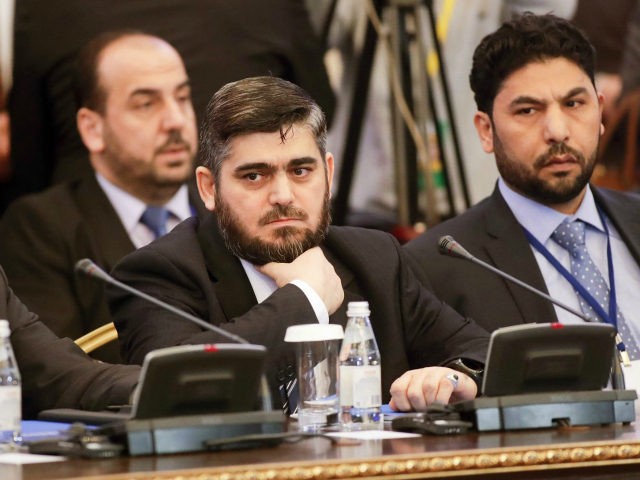The Syrian peace talks brokered by Russia, Turkey, and Iran have begun in Kazakhstan. The United States does not have a delegation at the talks, although the Kazakh government did send an invitation, with the support of Russia and Turkey (but most definitely not Iran).
The Wall Street Journal reports that the Trump administration cited the demands of the presidential transition when it declined to send a full State Department delegation. However, the U.S. ambassador to Kazakhstan, George Krol, will sit in on the talks.
Also left out of the peace talks: ISIS, al-Qaeda, Saudi Arabia, and the Kurdish-led, U.S.-backed Syrian Democratic Council. A powerful militant group named Ahrar al-Sham also declined to attend because it said the Syrian government was not honoring the current ceasefire agreement.
Reuters portrays the peace conference as off to a rocky start, with “frosty initial exchanges suggesting chances of a significant breakthrough were slim as the country’s six-year-old conflict ground on.”
There was a small glimmer of hope in that both sides have agreed to focus on strengthening and expanding the fragile ceasefire. (Actually, given how factional the rebels are, it would be better to say all sides.) The Syrian government had previously stated it wanted nothing less than a comprehensive political resolution to the civil war. In other words, everyone agrees Bashar Assad gets to remain in power.
On the other hand, the conference kicked off with regime representative Bashar al-Jaafari calling the rebels “rude and unprofessional” and saying they wished to excuse the war crimes of al-Qaeda’s Syrian affiliate, which is currently going by the name Fateh al-Sham.
The rebels countered by saying they would only speak to the government’s representatives through intermediaries and calling for a withdrawal of Iranian forces from Syria, a tough sell to the Assad regime and a possible non-starter for Tehran.
As Reuters reports, the peace talks feature no top officials from the Syrian regime and will end in just a few days. The U.N. is portraying the Kazakhstan conference as an opportunity to jump-start more serious discussions in the future. The shaky “ceasefire” is so shaky that 12 people were killed in airstrikes on Sunday.
“There are no direct negotiations first of all. The talks will be with the United Nations if the ceasefire is not implemented, particularly in Wadi Barada … in the Damascus country side, and the areas that the regime targets daily,” declared rebel leader Issam al-Reid, as CNN quotes. “Just yesterday, as is expected before every negotiation, the regime targeted the northern Homs countryside with airstrikes. We still don’t know which nation’s planes carried this out.”
The UK Guardian quotes the leader of the opposition delegation, Mohammed Alloush, demanding the release of thousands of prisoners, and saying that no comprehensive “political process” to resolve Syria’s future could begin until Bashar Assad is removed from power. Alloush’s accusations that Damascus is violating the ceasefire are the specific comments Syrian representative Bashar Jaafari denounced as rude, unprofessional, and “removed from democracy.”
The Guardian adds:
Russia believes the Astana talks could prove more fruitful than previous efforts, partly because Barack Obama’s administration is not involved, but also because the opposition has been weakened by defeat in Aleppo and because Turkey, once a hardline opponent of Assad, has recognized that his departure from office is no longer a precondition for political talks starting.
In another wrinkle, the Syrian government objected to Turkey’s participation in the peace talks because Turkish military units are currently operating on Syrian soil – ostensibly to fight ISIS, although they seem to be ramping up for battle against the Kurds.
The BBC notes there is general agreement that two “game changers” have occurred in Syria during the past few months: the eviction of rebel forces from the city of Aleppo and Russia’s rapprochement with Turkey. A third game-changer could be added to that list: the collapse of U.S. influence in the region under Obama policy. This deprives U.S. allies in Syria of crucial great-power support at a critical juncture and leaves the Trump administration with few strong cards to play.
Western influence in general has been greatly diminished. The BBC quotes a Syrian writer, Hassan Hassan, who worries that despite Russian and Turkish promises that the Kazakhstan talks will be a complement to U.N. efforts, the more likely outcome will be U.N. peace talks bending more toward the views of Damascus, Moscow, and Ankara – the “Astana-ization of Geneva,” as he put it, referring to the capital of Kazakhstan, where the current peace talks are being held.

COMMENTS
Please let us know if you're having issues with commenting.